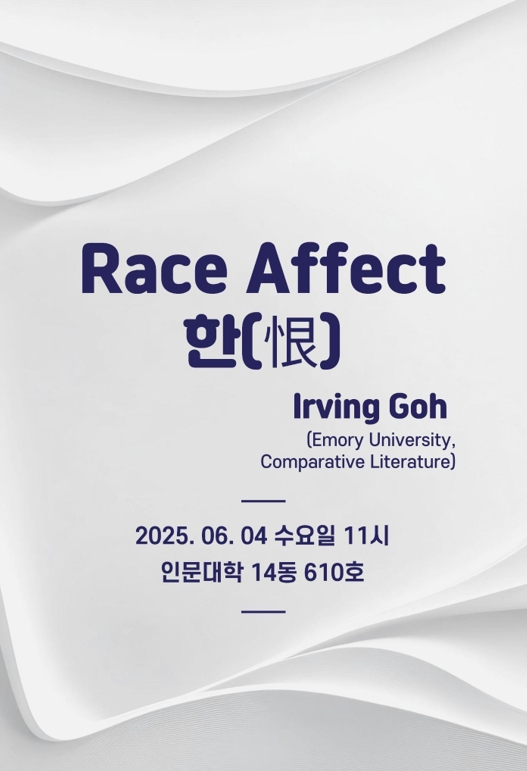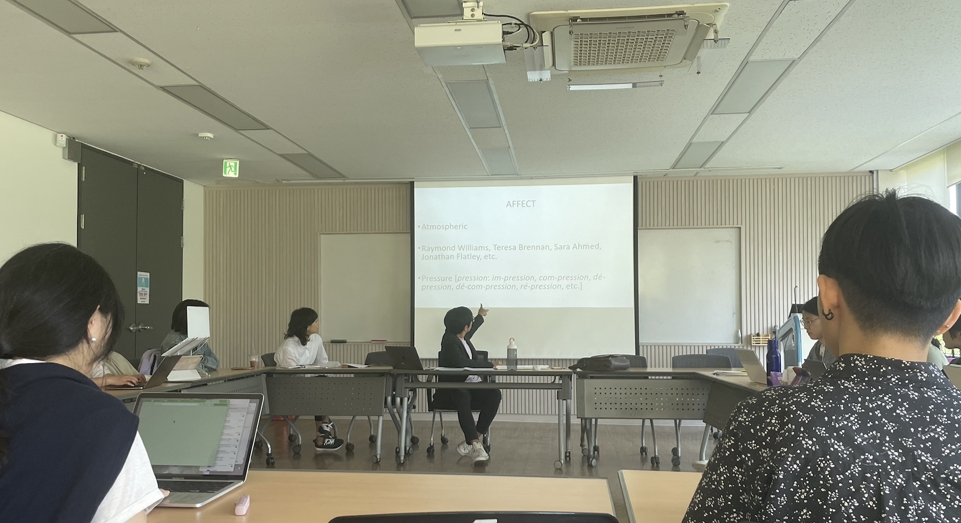In a recent workshop-lecture hosted by the Interdisciplinary Program in Comparative Literature and the Department of English Language and Literature at Seoul National University, Professor Irving Goh delivered a compelling talk titled “Race Affect Han (한),” exploring the complex relationship between race, emotion, and cultural identity. Drawing from both continental philosophy and contemporary Asian American critique, Professor Goh examined how the concepts of race, affect, and han shape and complicate the emotional experience of racialized life.

Poster for “Race Affect Han”
To prepare for the workshop-lecture, students engaged with a set of readings that laid the groundwork for the discussion. These included excerpts from Korean American author Cathy Park Hong’s memoir Minor Feelings, Meera Lee’s article “Sorrowful Feeling: Han and Its Haunting Legacies,” and Sandra So Hee Chi Kim’s article “Korean Han and the Postcolonial Afterlives of ‘The Beauty of Sorrow.’” Together, these texts trace whether han continues to resonate across generational, national, and diasporic lines. Hong’s exploration of racialized emotion in particular became a central point of focus for Professor Goh’s lecture, which echoed and extended many of the questions raised in the readings.
The lecture introduced key themes from Professor Goh’s forthcoming project, The Be-latedness of the Asian, which will delve into how many Asians come to reckon with race not immediately but through a delayed process of awareness. Reflecting on his own background as a scholar trained in French theory, Professor Goh explained how he had long been distanced from discourses on race, having been shaped by a philosophical tradition that privileges abstract structures over emotional life. A turning point came when he read Hong’s Minor Feelings, which prompted a personal and intellectual reckoning. What he had previously overlooked or left unnamed was, in fact, a form of racial affect.

Professor Goh delivering his talk
This concept of belatedness was central to his talk. Professor Goh used it not only autobiographically but also as a framework for understanding how many contemporary Asians, especially those raised outside the West, encounter race as something that only becomes visible through moments of rupture or dislocation. Referencing philosopher Alain Badiou, he described this as a kind of forced recognition that reconfigures one’s sense of identity and belonging. Once placed within Western racial frameworks, Asians are often assigned roles they did not choose, such as the “model minority,” and find themselves caught in binaries that obscure the complexity of their experience.
Professor Goh explored how the emotional impact of these encounters is often subtle and difficult to articulate. Drawing on various theorists, he argued that racialized affect is frequently expressed through unease, confusion, or hesitation rather than overt expressions of rage. These quiet, persistent emotions are powerful, yet there is often no established vocabulary to describe them. This is where han becomes a valuable concept. A Korean term commonly translated as sorrow, grief, or resentment, han is difficult to define and resists simplification. Professor Goh explained that, like affect, han is internal and atmospheric. It builds over time and is often expressed through silence, art, or gesture rather than confrontation.
Although han is traditionally seen as a uniquely Korean feeling, Professor Goh encouraged the audience to consider its broader political and emotional potential. He traced the term’s etymological roots to the Chinese hèn and noted its complex colonial history, including its use by Japanese authorities to frame Koreans as emotionally inferior. Rather than seeing han as a fixed national sentiment, he proposed casting it in broader contours and using it as a conceptual tool to think across Asian experiences. Could han provide a language for the muted, unresolved emotional states that many racialized Asians carry but cannot easily express within Western frameworks?
By approaching han as both an emotional condition and a political possibility, Professor Goh invited students to imagine new ways of understanding race that account for quiet grief, accumulated hurt, and generational loss. In doing so, he proposed a shift from dominant models of political rage toward more nuanced forms of emotional expression.
Professor Goh’s lecture offered a reflection on how we might create new vocabularies for racial feeling and solidarity. This lecture was conducted as part of Seoul National University’s commitment to fostering critical dialogue and interdisciplinary thought. We invite readers to engage in wider discussion on how we approach race and identity in Korean academic and everyday contexts.
Written by Jung Hyun Kyung, SNU English Editor, jhyunk@snu.ac.kr

